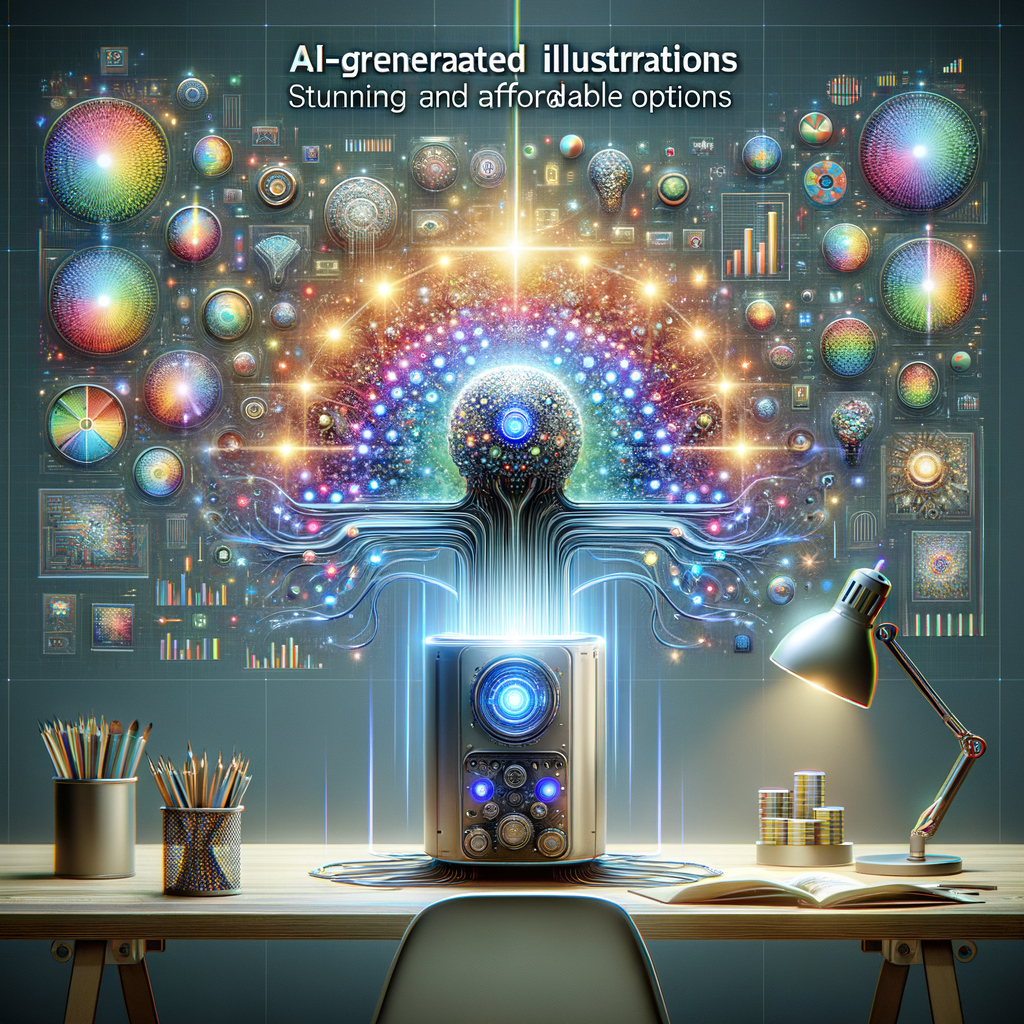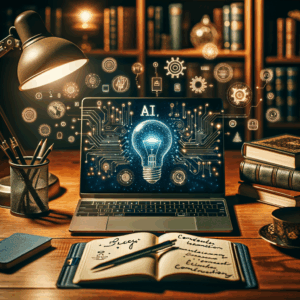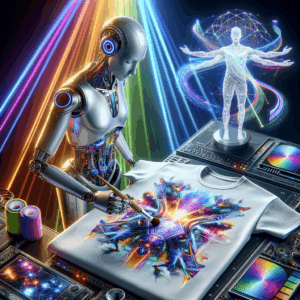
AI-Generated Illustrations: Stunning And Affordable Options
- Understanding AI-Generated Illustrations
- Benefits of Using AI-Generated Illustrations
- Cost-Effective Solutions
- Time Efficiency
- How AI Illustration Works
- Machine Learning and Algorithms
- Types of AI-Generated Illustrations
- Top Tools for AI-Generated Illustrations
- DALL-E 2
- MidJourney
- Canva’s AI Features
- Artbreeder
- Runway
- How to Effectively Use AI-Generated Illustrations
- Identify Your Needs
- Select the Right Tool
- Optimize for SEO
- Best Practices for Using AI-Generated Illustrations
- Maintain Consistency
- Test Different Styles
- Consider Licensing
- Examples of Successful Uses of AI-Generated Illustrations
- Marketing Campaigns
- Educational Content
- Social Media Engagement
- The Future of AI-Generated Illustrations
- Continuous Improvement
- Integration with Virtual Reality (VR)
- Ethical Considerations
- FAQs
- 1. Can I use AI-generated illustrations for commercial purposes?
- 2. Do I need design experience to use AI-generated illustrations?
- 3. Are AI-generated illustrations customizable?
- 4. How can AI-generated illustrations enhance my marketing efforts?
- 5. Are there free options available for AI-generated illustrations?
- 6. How do I choose the right AI illustration tool for my project?
- 7. Can I blend multiple illustrations using AI?
- 8. Is there a risk of copyright infringement with AI-generated illustrations?
- 9. Will AI-generated illustrations become better over time?
- 10. How can I optimize AI-generated illustrations for SEO?
- Conclusion
- References
Understanding AI-Generated Illustrations
In today’s digital world, visuals play a crucial role in storytelling and communication. They capture attention, make content more engaging, and help convey messages effectively. With the rise of artificial intelligence (AI), creating stunning illustrations has become easier and more affordable than ever. This blog will explore how AI-generated illustrations work, their benefits, and the top tools available for anyone looking to enhance their visual content.
AI-generated illustrations leverage sophisticated algorithms and machine learning techniques to create images from scratch or modify existing ones. Unlike traditional illustrations, which can be time-consuming and expensive, AI tools offer a quicker and more cost-effective solution. These tools can generate images in various styles, allowing users to achieve a unique and captivating aesthetic with minimal effort.
Why should you consider using AI-generated illustrations? Apart from affordability and speed, they offer flexibility. Businesses, marketers, and content creators can quickly produce images tailored to their specific needs. Whether you are designing a website, creating social media posts, or working on an e-book, AI illustrations could be the key to captivating your audience and enhancing your brand’s visual identity.
Benefits of Using AI-Generated Illustrations
Cost-Effective Solutions
Traditional illustration can drain budgets fast. Hiring a professional illustrator or graphic designer often involves significant checks. In contrast, AI-generated illustrations provide a fraction of those costs. Many AI tools offer free or low-cost versions, allowing you to create multiple images without breaking the bank.
Moreover, budget limitations shouldn’t hinder creativity. With AI-generated illustrations, anyone can access high-quality visuals. This affordability democratizes illustration, enabling small businesses and independent creators to thrive.
Time Efficiency
Apart from being affordable, AI tools save you time. Traditional illustration processes can take weeks or even months. In contrast, AI-generated illustrations can provide instant results. This speed allows creators to focus on other aspects of their projects, like content strategy or marketing.
Additionally, most AI illustration tools are user-friendly. Even those with limited design experience can navigate them easily. This accessibility means greater creativity and faster project completion.
How AI Illustration Works
Machine Learning and Algorithms
AI-generated illustrations primarily rely on machine learning and neural networks. These advanced systems analyze vast amounts of data, including existing images and artistic styles. By learning from this data, the AI can create illustrations that resemble the styles it has “learned.”
For instance, if you input keywords like “sunset” or “cityscape,” the AI processes these inputs and generates unique images based on the patterns it recognizes from its training data. This capability opens up a world of options for diverse styles and themes.
Types of AI-Generated Illustrations
– Vector Art: This involves creating images with points, lines, and curves. Vector art is scalable, meaning it retains its quality regardless of size.
– 3D Models: AI can create three-dimensional illustrations for product mockups, gaming environments, and architectural designs.
– Abstract Art: Some tools specialize in generating abstract illustrations. They can create vibrant and unique pieces that make for eye-catching backgrounds or design elements.
Understanding these types helps you choose the right illustration for your project. Whether you need something realistic, abstract, or even playful, there’s an AI tool suited for the task.
Top Tools for AI-Generated Illustrations
DALL-E 2
DALL-E 2, developed by OpenAI, allows users to create images from textual descriptions. You can input phrases like “a cat in a space suit” and watch DALL-E generate an image tailored to your request. Its ability to integrate complex ideas into visuals makes it perfect for creative content.
Pros:
– Intuitive interface
– High-quality images
– Diverse styles
Cons:
– Some may find the output inconsistent
– Requires internet access
MidJourney
MidJourney focuses on generating artistic images based on user prompts. This tool is particularly popular among graphic designers and artists who want to explore varying aesthetics. It excels in creating vibrant and intricate illustrations.
Pros:
– Artistic output
– User-friendly
– Wide variety of styles
Cons:
– Subscription model can be pricey
– Limited free version
Canva’s AI Features
Canva combines graphic design with AI capabilities. While primarily known as a design tool, Canva now incorporates AI to enhance illustrations. Users can generate images, adjust styles, and apply filters directly within their projects.
Pros:
– All-in-one design platform
– Easy to use
– Great for beginners
Cons:
– Limited AI capabilities compared to specialized tools
– Some features locked behind a paywall
Artbreeder
Artbreeder allows users to blend existing images and modify specific features. You can choose various parameters to generate unique illustrations. This makes it ideal for character design or conceptual art.
Pros:
– Unique, customizable options
– User-friendly interface
– Great community for inspiration
Cons:
– May have a learning curve for new users
– Certain features require a subscription
Runway
Runway is a powerful tool for creatives. It offers multiple AI-assisted features, from video editing to image generation. Users can generate illustrations based on their specific needs while leveraging other media capabilities.
Pros:
– Versatile tool for various mediums
– High-quality output
– Regular updates with new features
Cons:
– Can be overwhelming for beginners
– Subscription model may not suit all users
How to Effectively Use AI-Generated Illustrations
Identify Your Needs
Before diving into using AI-generated illustrations, take a moment to consider your specific needs. Are you looking for imagery to accompany a blog post, or do you need visuals for social media marketing? Understanding your audience and purpose will guide your choices.
Select the Right Tool
With numerous tools available, selecting the right one based on your project goals is essential. For quick graphics, platforms like Canva offer easy-to-use interfaces and a variety of templates. If you’re looking for more artistic expressions, tools like DALL-E or MidJourney can cater to your creative needs.
Optimize for SEO
To leverage AI-generated illustrations effectively, consider SEO best practices. Naming your images appropriately with relevant keywords helps boost search visibility. Use descriptive alt text to ensure search engines recognize the content and context of your images.
Best Practices for Using AI-Generated Illustrations
Maintain Consistency
When integrating AI-generated illustrations into your brand, consistency is key. Use similar styles, colors, and themes to create a cohesive visual identity. This helps strengthen brand recognition and provides a unified experience for your audience.
Test Different Styles
Don’t be afraid to experiment with various styles and themes. AI-generated illustrations allow for easy iteration. Try different looks to see what resonates with your audience, whether playful, professional, or abstract.
Consider Licensing
While many AI-generated illustrations may be free or low-cost, understanding licensing is vital. Ensure you’re aware of any restrictions regarding commercial use or modifications. This protects you from potential legal issues later.
Examples of Successful Uses of AI-Generated Illustrations
Marketing Campaigns
Several brands have successfully used AI-generated illustrations in marketing campaigns. For example, a tech company utilized AI-generated visuals to showcase product features. The result? Engaging content that stood out in a crowded marketplace.
Educational Content
Some educators have embraced AI-generated illustrations to create vibrant materials. From infographics to interactive content, these visuals enhance learning experiences. AI not only generates attention-grabbing images but also aids in explaining complex concepts.
Social Media Engagement
Brands often use AI-generated illustrations for their social media posts. Unique visuals can significantly increase engagement rates. Companies create eye-catching content that captures followers’ attention, leading to shares and interactions.
The Future of AI-Generated Illustrations
Continuous Improvement
As AI technology evolves, the quality of AI-generated illustrations will only improve. More advanced algorithms will enhance image quality and diversity, offering users an even more extensive range of options. This constant evolution presents exciting potentials for creators.
Integration with Virtual Reality (VR)
Looking ahead, there’s potential for AI-generated illustrations to integrate with virtual and augmented reality. Imagine stepping into a world crafted entirely by AI, where visuals are customized to the user’s preferences in real time. This innovation could revolutionize content creation, making it more immersive and interactive.
Ethical Considerations
As AI-generated illustrations become mainstream, discussions around ethics will continue. Issues like copyright and the impact of AI on traditional artists may arise. Addressing these concerns will be crucial in ensuring a fair and responsible use of AI technology in the creative space.
FAQs
1. Can I use AI-generated illustrations for commercial purposes?
Yes, but always check the licensing terms of the tool you are using. Some may have specific restrictions.
2. Do I need design experience to use AI-generated illustrations?
No, most AI tools are user-friendly and do not require design experience.
3. Are AI-generated illustrations customizable?
Yes, many tools allow you to modify features, colors, and styles to fit your needs.
4. How can AI-generated illustrations enhance my marketing efforts?
They can capture attention, improve engagement, and provide an eye-catching visual representation of your brand.
5. Are there free options available for AI-generated illustrations?
Yes, several tools offer free versions, though they may have limitations compared to paid options.
6. How do I choose the right AI illustration tool for my project?
Identify your specific needs and consider the output quality, user-friendliness, and any costs associated with the tools.
7. Can I blend multiple illustrations using AI?
Yes, tools like Artbreeder allow you to combine various images and modify specific aspects.
8. Is there a risk of copyright infringement with AI-generated illustrations?
Understanding the licensing of the AI tool you choose is crucial to avoid infringement issues.
9. Will AI-generated illustrations become better over time?
Yes, as AI technology evolves, the quality and variety of illustrations will likely improve.
10. How can I optimize AI-generated illustrations for SEO?
Use descriptive file names and alt text when uploading your images to improve search visibility.
Conclusion
AI-generated illustrations offer stunning, affordable options for anyone looking to enhance their visual content. As technology continues to evolve, these tools will enable creativity and accessibility like never before. From marketing campaigns to educational materials, the possibilities are endless. Embracing AI-generated illustrations can elevate your projects while keeping costs low. So, embark on this journey, explore the tools available, and let your imagination run wild!
—
References
1. OpenAI DALL-E 2 – OpenAI
2. MidJourney Overview – MidJourney
3. Canva Features – Canva
4. Artbreeder Tool – Artbreeder
5. Runway AI Overview – Runway

